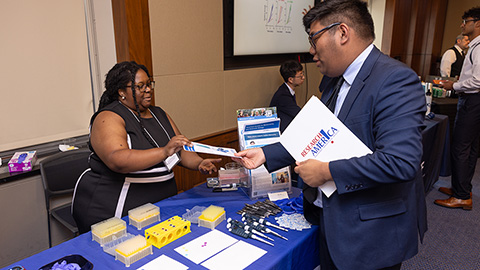ASBMB weighs in on the PREVENT Pandemics Act
The American Society for Biochemistry and Molecular Biology provided feedback last week to the U.S. Senate Committee on Health, Education, Labor and Pensions on its discussion draft of a bipartisan bill addressing the government’s failures during the COVID-19 pandemic and outlining preparations the U.S. should make for future pandemics.
The ASBMB characterized the legislation as “vital,” saying that it “would strengthen U.S. public health institutions, improve interagency coordination and ensure that Americans are prepared for pandemics.” But the society recommended including language in the bill to do the following:
1. Establish the Advanced Research Projects Agency for Health as an autonomous agency.
“The structure of ARPA-H must be independent from other agencies, the research priorities of ARPA-H must be narrow and targeted, and the funding for ARPA-H must be separate and independent from funding for the (National Institutes of Health),” the society wrote.
This recommendation was in line with the society’s stance in July, at which time it urged the Biden administration to use ARPA-H to fund high-risk, high-reward projects while keeping the agency’s budget “lean and nimble.”
2. Strengthen the science, engineering, technology and math workforce to sustain the American research enterprise.
“(I)nsufficient federal funding for U.S. universities and biological sciences training programs has the potential to diminish America’s ability to produce and retain a skilled technical workforce. Without a skilled research workforce, the U.S. cannot sufficiently conduct the discovery research needed to understand viruses, their origins, treatments and transmission,” the society wrote.
More specifically, the society recommended that Congress allocate funds to ensure that institutions are adequately preparing those earning STEM doctorates for diverse career paths, to broaden participation in STEM and to expand experiential learning opportunities, such as internships.
3. Invest in research infrastructure at federal facilities, minority-serving institutions and emerging research institutions.
The society noted that national labs “have proved to be vital in responding to the COVID-19 pandemic and keeping the country safe.” It also argued that historically Black colleges and universities and other minority-serving institutions, which have been “leading institutions researching health disparities, made ever more dire by the COVID-19 pandemic,” need funding “to invest in new facilities, repair existing buildings, and purchase new instrumentation to better accommodate STEM majors and train the next generation of scientists and physicians.”
The main goals of the PREVENT Pandemics Act include:
- Establish a task force for reviewing SARS-CoV-2 origins and the COVID-19 response.
- Improve strategy and coordination across health agencies and address misinformation.
- Enhance the development of tests, drugs and vaccines.
- Bolster stockpiles of medical supplies.
- Reform policies at the Centers for Disease Control and Prevention to increase accountability and leadership.
- Address disparities which make public health emergencies harder on at-risk populations.
U.S. Sens. Patty Murray, D-Wash., and Richard Burr, R-N.C., released the discussion draft on behalf of https://www.help.senate.gov/about/members.
“After everything our nation has been through these past two years, we owe it to everyone who worked so hard to get us through this crisis to take every step we can to make sure we are never in this situation again, and that’s what this bill will help us get done,” Murray said in a statement.
The past few decades have yielded multiple epidemics and outbreaks: AIDS in 1981, H1N1 (swine flu) in 2009, Ebola and Zika around 2015 and now COVID-19. Experts are 100% certain that “another deadly infection will strike.”
Scientists and policymakers are learning from the mistakes made by the government during COVID-19 and looking toward prevention as the best medicine when it comes to fighting future pandemics. Not only would preventative measures save lives, but they also are estimated to cost a fraction in comparison with reactive measures, protecting our economy.
Ranking member Burr emphasized in the committee’s statement: “As the response to COVID-19 continues to evolve, we must reflect on the lessons learned from the last two years and determine where we were successful, where we failed, and what we did not anticipate so we are better prepared for the next threat we face.”
Read the society’s full comments here.
Enjoy reading ASBMB Today?
Become a member to receive the print edition four times a year and the digital edition monthly.
Learn moreGet the latest from ASBMB Today
Enter your email address, and we’ll send you a weekly email with recent articles, interviews and more.
Latest in Policy
Policy highlights or most popular articles

Embrace your neurodivergence and flourish in college
This guide offers practical advice on setting yourself up for success — learn how to leverage campus resources, work with professors and embrace your strengths.

ASBMB honors Lawrence Tabak with public service award
He will deliver prerecorded remarks at the 2025 ASBMB Annual Meeting in Chicago.

Summer internships in an unpredictable funding environment
With the National Institutes of Health and other institutions canceling summer programs, many students are left scrambling for alternatives. If your program has been canceled or delayed, consider applying for other opportunities or taking a course.

Black excellence in biotech: Shaping the future of an industry
This Black History Month, we highlight the impact of DEI initiatives, trailblazing scientists and industry leaders working to create a more inclusive and scientific community. Discover how you can be part of the movement.

ASBMB releases statement on sustaining U.S. scientific leadership
The society encourages the executive and legislative branches of the U.S. government to continue their support of the nation’s leadership in science.

ASBMB and advocacy: What we accomplished in 2024
PAAC members met with policymakers to advocate for basic scientific research, connected some fellow members with funding opportunities and trained others to advocate for science.

